- Fostering an Inclusive & Respectful Supervisory environment: Gain understanding and develop cultural competence and sensitivity so that your supervisees feel seen and supported.
- Exploring Ethical Dilemmas in Cross-Cultural Supervision: Discuss and identify solutions to common dilemmas from a cultural and ethical lens.
- Effectively Support Supervisees: Learn how to be culturally aware and inclusive of your supervisees from diverse backgrounds, promoting their professional development and well-being.
-
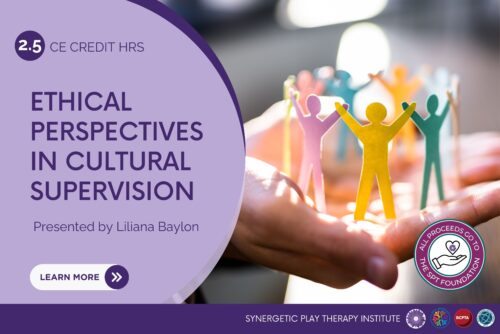
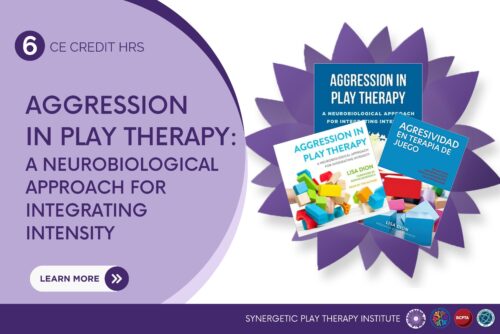 With an understanding of aggressive play based on brain function and neuroscience, this book provides therapists with a framework to work authentically with aggressive play, while making it an integrative and therapeutic experience for the child. Through the lens of principles from Synergetic Play Therapy®, therapists are taught how to integrate the intensity experienced by both the child and the therapist during aggressive play in a way that leads towards greater healing and integration. The book explains the neurological processes that lead kids to dysregulation and provides therapists with tools to help their clients facilitate deep emotional healing, without causing their own nervous system to shut down. Chapter Topics Include:
With an understanding of aggressive play based on brain function and neuroscience, this book provides therapists with a framework to work authentically with aggressive play, while making it an integrative and therapeutic experience for the child. Through the lens of principles from Synergetic Play Therapy®, therapists are taught how to integrate the intensity experienced by both the child and the therapist during aggressive play in a way that leads towards greater healing and integration. The book explains the neurological processes that lead kids to dysregulation and provides therapists with tools to help their clients facilitate deep emotional healing, without causing their own nervous system to shut down. Chapter Topics Include:- Aggression in the Playroom and Making Aggressive Play Therapeutic
- Understanding the Nervous System
- What Regulation Really Means
- Developing Yourself as the External Regulator
- The Set-Up in Play Therapy
- Authentic Expression
- Setting Boundaries
- Working with Emotional Flooding
- Hyper-Aroused Play
- Observing Play
- Hypo-Aroused Play
- Working with Parents
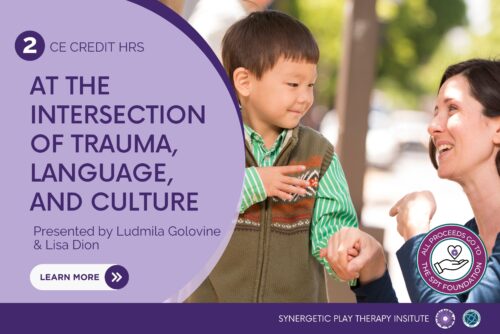 This dynamic, two-hour video course delves into the intricate interplay between trauma, neurocognitive processes, and communication patterns, shedding light on the challenges therapists face when working with survivors of trauma, especially those from culturally diverse backgrounds or with language barriers. Did you know that trauma's profound impact on neurocognitive functioning can significantly influence communication dynamics within therapeutic settings? This, coupled with cultural and linguistic disparities, can pose an added challenge when trying to establish rapport and foster healing with clients, particularly among Limited English Proficient or Deaf/Hard of Hearing individuals! Join Mila Golovine, President & CEO of Masterword. and Lisa Dion, Founder & President of the Synergetic Play Therapy Institute as they navigate the intersections of cultural competency, trauma-informed therapy, and effective communication strategies. You will also get insights into enhancing the therapeutic alliance, fostering better client engagement, and ultimately improving therapeutic outcomes! Key highlights include:
This dynamic, two-hour video course delves into the intricate interplay between trauma, neurocognitive processes, and communication patterns, shedding light on the challenges therapists face when working with survivors of trauma, especially those from culturally diverse backgrounds or with language barriers. Did you know that trauma's profound impact on neurocognitive functioning can significantly influence communication dynamics within therapeutic settings? This, coupled with cultural and linguistic disparities, can pose an added challenge when trying to establish rapport and foster healing with clients, particularly among Limited English Proficient or Deaf/Hard of Hearing individuals! Join Mila Golovine, President & CEO of Masterword. and Lisa Dion, Founder & President of the Synergetic Play Therapy Institute as they navigate the intersections of cultural competency, trauma-informed therapy, and effective communication strategies. You will also get insights into enhancing the therapeutic alliance, fostering better client engagement, and ultimately improving therapeutic outcomes! Key highlights include:- Understanding how trauma affects neurocognitive processes and communication patterns.
- Exploring cultural competence in therapy and its significance in trauma recovery.
- Identifying challenges and strategies for effective communication with clients from diverse backgrounds.
- Best practices for working with Limited English Proficient or Deaf/Hard of Hearing clients.
- Practical techniques to promote therapeutic alliance and engagement.
- Ethical considerations and sensitivity when utilizing interpreters in therapy sessions.
 This 1.5-hour recorded webinar, in the form of a roundtable discussion, delves into the evolving landscape of diversity, inclusion, and cultural awareness in mental health, exploring how to create a more inclusive and culturally sensitive clinical practice. Led by Lisa Dion, guest panelists Marshall Lyles, Liliana Baylon, and Robert Jason Grant will share their insights and expertise on a range of essential topics, fostering a deeper understanding of the role culture plays in the therapy process, embracing neurodiversity, and creating inclusive play spaces to cater to individual needs. *The course is provided by the Synergetic Play Therapy Foundation. The Synergetic Play Therapy Foundation is dedicated to helping make play therapy trainings accessible and affordable to clinicians worldwide and to funding research initiatives in Synergetic Play Therapy. The Synergetic Play Therapy Foundation provides scholarships to clinicians seeking post-graduate training in Synergetic Play Therapy or another play therapy model of their choosing. Scholarships are funded through donations from webinars, donors, and supporters of Play Therapy. By purchasing this course, you are making a direct donation to the Synergetic Play Therapy Foundation. All proceeds will contribute to future scholarships and to the foundation itself! Please scroll down for course details and objectives.
This 1.5-hour recorded webinar, in the form of a roundtable discussion, delves into the evolving landscape of diversity, inclusion, and cultural awareness in mental health, exploring how to create a more inclusive and culturally sensitive clinical practice. Led by Lisa Dion, guest panelists Marshall Lyles, Liliana Baylon, and Robert Jason Grant will share their insights and expertise on a range of essential topics, fostering a deeper understanding of the role culture plays in the therapy process, embracing neurodiversity, and creating inclusive play spaces to cater to individual needs. *The course is provided by the Synergetic Play Therapy Foundation. The Synergetic Play Therapy Foundation is dedicated to helping make play therapy trainings accessible and affordable to clinicians worldwide and to funding research initiatives in Synergetic Play Therapy. The Synergetic Play Therapy Foundation provides scholarships to clinicians seeking post-graduate training in Synergetic Play Therapy or another play therapy model of their choosing. Scholarships are funded through donations from webinars, donors, and supporters of Play Therapy. By purchasing this course, you are making a direct donation to the Synergetic Play Therapy Foundation. All proceeds will contribute to future scholarships and to the foundation itself! Please scroll down for course details and objectives.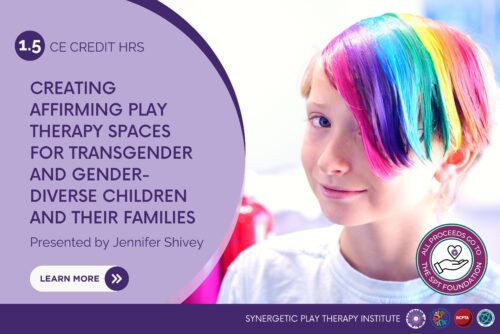 Transgender and gender-diverse children face unique challenges in navigating their identities and experiences. Their families face challenges, too, but can often be fearful of voicing them due to worries about how others may perceive them. Clinicians are often well meaning but can do unintended harm due to the blind spots they are not aware of when working with this population. Play therapy offers a dynamic and effective approach to support these children and their families in understanding and expressing themselves in a safe and affirming environment, given the appropriate knowledge offered by the clinician. This workshop aims to equip therapists with the knowledge, skills, and confidence necessary to provide effective and affirming play therapy for transgender and gender-diverse children - and their families! Scroll down for all of the course details!
Transgender and gender-diverse children face unique challenges in navigating their identities and experiences. Their families face challenges, too, but can often be fearful of voicing them due to worries about how others may perceive them. Clinicians are often well meaning but can do unintended harm due to the blind spots they are not aware of when working with this population. Play therapy offers a dynamic and effective approach to support these children and their families in understanding and expressing themselves in a safe and affirming environment, given the appropriate knowledge offered by the clinician. This workshop aims to equip therapists with the knowledge, skills, and confidence necessary to provide effective and affirming play therapy for transgender and gender-diverse children - and their families! Scroll down for all of the course details!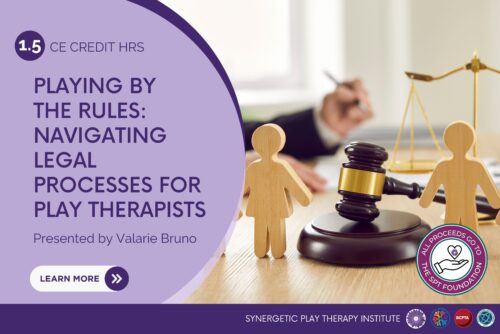 When play therapy intersects with the legal system, play therapists often find themselves in unfamiliar territory. Navigating legal processes can be daunting without proper guidance, leaving therapists feeling uncertain and ill-prepared to advocate for their clients effectively. Learn what you need to know to steer through the legal system with ease and confidence. You’ll leave this presentation empowered to effectively advocate for your clients, ensuring their voices are heard and their needs are met. Scroll down for all of the course details!
When play therapy intersects with the legal system, play therapists often find themselves in unfamiliar territory. Navigating legal processes can be daunting without proper guidance, leaving therapists feeling uncertain and ill-prepared to advocate for their clients effectively. Learn what you need to know to steer through the legal system with ease and confidence. You’ll leave this presentation empowered to effectively advocate for your clients, ensuring their voices are heard and their needs are met. Scroll down for all of the course details!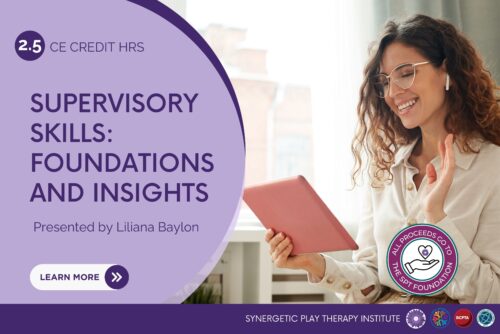 Are you looking to elevate your play therapy supervision practice, gain confidence, and ensure you're fully equipped to support your supervisees? Join us for this transformative experience where you’ll gain practical tools and in-depth knowledge to feel more prepared and confident in your role as a supervisor. It’s about giving you the structure you need to navigate the often complex world of supervision. This course will delve into critical topics that will transform your supervision practice, including:
Are you looking to elevate your play therapy supervision practice, gain confidence, and ensure you're fully equipped to support your supervisees? Join us for this transformative experience where you’ll gain practical tools and in-depth knowledge to feel more prepared and confident in your role as a supervisor. It’s about giving you the structure you need to navigate the often complex world of supervision. This course will delve into critical topics that will transform your supervision practice, including:- Principles & Theoretical Frameworks: Ground your supervision in solid theoretical foundations to ensure ethical, effective guidance.
- Clarifying Roles & Relationships: Understand the distinctions between supervision and consultation—what have you agreed upon, and how can you maintain clarity in these roles?
- Gatekeeping & Power Dynamics: Explore the importance of gatekeeping in supervision and how to handle power dynamics with awareness and grace.
- Navigating Ethical Dilemmas: Learn to recognize and manage ethical dilemmas, set clear boundaries, and know your limitations—where do you turn when you need guidance?
- Tailoring Supervision to Specific Standards: Each practice setting, whether private practice or agency work, has different standards and guidelines. We’ll discuss the important questions to ask and considerations to keep in mind regardless of location or regulatory environment.
- Addressing Language Barriers: Discuss ethical considerations when your supervisee speaks a different language or when English isn't their first language.
- Empowering vs. Instructing: Learn how to support growth and empowerment in your supervisees by encouraging curiosity and reflective practice, rather than simply telling them what to do.
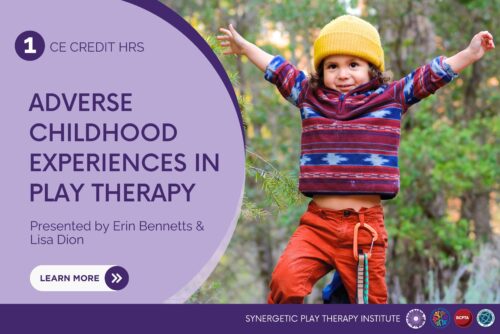 Adverse Childhood Experiences (ACES) can be a part of growing up. But how can we help turn these obstacles into opportunities for growth and resilience and apply this knowledge to the play therapy process? This course explores how play therapy can be used to help mitigate the effects of ACES. Learn the major categories of ACES, along with protective factors or strategies that have been shown to be helpful both in the short-term and long-term. This course is designed to enhance or increase the professional knowledge of graduate-level counselors.
Adverse Childhood Experiences (ACES) can be a part of growing up. But how can we help turn these obstacles into opportunities for growth and resilience and apply this knowledge to the play therapy process? This course explores how play therapy can be used to help mitigate the effects of ACES. Learn the major categories of ACES, along with protective factors or strategies that have been shown to be helpful both in the short-term and long-term. This course is designed to enhance or increase the professional knowledge of graduate-level counselors. As play therapists, we are often searching for ways to help our clients regulate their emotions and body. This webinar explores how therapists can use yoga to increase their ability to connect with themselves and their clients while facilitating the regulation of emotions and body during play therapy sessions.
As play therapists, we are often searching for ways to help our clients regulate their emotions and body. This webinar explores how therapists can use yoga to increase their ability to connect with themselves and their clients while facilitating the regulation of emotions and body during play therapy sessions.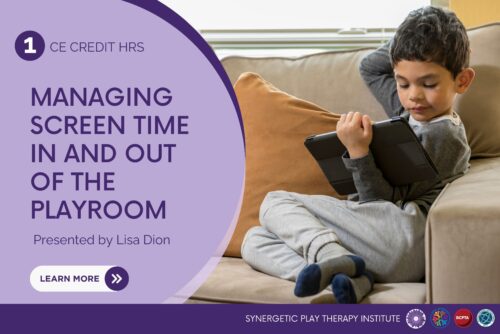 We live in a technological age: there is no pacifying Pac-Man, no axing Apple. But screen time doesn’t always mean zoning out. In moderation, Mickey Mouse and Mario can be our allies, helping children better connect to the world around them. This webinar explores the therapeutic value of screen time and how to use it as part of a play therapy process. Learn how to recognize when a child is using it to avoid and when a child’s use of technology is the perfect entry into the therapeutic alliance.
We live in a technological age: there is no pacifying Pac-Man, no axing Apple. But screen time doesn’t always mean zoning out. In moderation, Mickey Mouse and Mario can be our allies, helping children better connect to the world around them. This webinar explores the therapeutic value of screen time and how to use it as part of a play therapy process. Learn how to recognize when a child is using it to avoid and when a child’s use of technology is the perfect entry into the therapeutic alliance. We know that supporting a child struggling with obsessive compulsions can be incredibly challenging. Often, the desire to move the child out of their rigidity and rituals can overshadow the deeper issues and stressors driving the behaviors. We also know that Obsessive Compulsive Disorder is a complex disorder as the reasons behind the behaviors vary widely from managing anxiety to past traumas to focused energy inside of a child driving them towards their genius and that which is most meaningful. Due to the complexity, we can often mis-label, mis-understand, and mis-guide these children in how to work with and understand their rituals and need for perfectionism. We also can inadvertently intensify the inner struggle that is often experienced by these children as they attempt to stop, control, and even deny the urges in their bodies. And that is why we created this course, so you know what to do when OCD shows up in your play therapy sessions! Drawing from Synergetic Play Therapy and Interpersonal Neurobiology, this course explores non-directive and directive play based interventions to help support play therapists on a path to understand the perfection in these children's perfection, while teaching the child how to do the same. Play therapists will take a deeper look at the regulatory function of the child’s behaviors that manage the internal conflicts and anxieties these children often carry. Through discussion topics and experiential exercises, play therapists will learn how to separate the underlying drivers from the wisdom of the rituals themselves. With this knowledge, play therapists will learn how to use themselves and many forms of play to help these children access an understanding of the greatest perfection that exists, the child just as they are. “I loved Lisa's knowledge and approach - very open minded but also structured. Her personal stories of working with clients were very impactful and made it easy to attach the theories to real scenarios.” - Student testimonial See the full course description below.
We know that supporting a child struggling with obsessive compulsions can be incredibly challenging. Often, the desire to move the child out of their rigidity and rituals can overshadow the deeper issues and stressors driving the behaviors. We also know that Obsessive Compulsive Disorder is a complex disorder as the reasons behind the behaviors vary widely from managing anxiety to past traumas to focused energy inside of a child driving them towards their genius and that which is most meaningful. Due to the complexity, we can often mis-label, mis-understand, and mis-guide these children in how to work with and understand their rituals and need for perfectionism. We also can inadvertently intensify the inner struggle that is often experienced by these children as they attempt to stop, control, and even deny the urges in their bodies. And that is why we created this course, so you know what to do when OCD shows up in your play therapy sessions! Drawing from Synergetic Play Therapy and Interpersonal Neurobiology, this course explores non-directive and directive play based interventions to help support play therapists on a path to understand the perfection in these children's perfection, while teaching the child how to do the same. Play therapists will take a deeper look at the regulatory function of the child’s behaviors that manage the internal conflicts and anxieties these children often carry. Through discussion topics and experiential exercises, play therapists will learn how to separate the underlying drivers from the wisdom of the rituals themselves. With this knowledge, play therapists will learn how to use themselves and many forms of play to help these children access an understanding of the greatest perfection that exists, the child just as they are. “I loved Lisa's knowledge and approach - very open minded but also structured. Her personal stories of working with clients were very impactful and made it easy to attach the theories to real scenarios.” - Student testimonial See the full course description below. Eating challenges in children can show up in many ways. From the refusal to eat to eating too much, underneath often lies the need for perfectionism and control. Helping kids take these challenges off their plates involves offering choices and uncovering co-existing issues, as well as providing parental support. This course takes a look at this important struggle.
Eating challenges in children can show up in many ways. From the refusal to eat to eating too much, underneath often lies the need for perfectionism and control. Helping kids take these challenges off their plates involves offering choices and uncovering co-existing issues, as well as providing parental support. This course takes a look at this important struggle.

